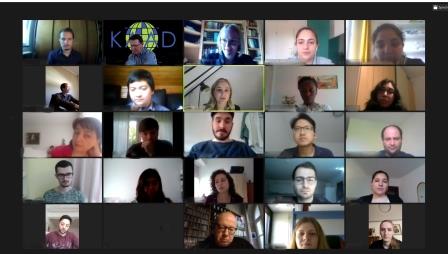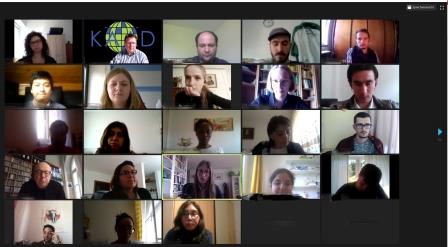The seminar “Big Data and Artificial Intelligence” was conducted as a pilot online seminar on May 26th, 2020, and thanks to its topic it was obviously predestined to be KAAD’s first online seminar. 24 KAAD scholars from 18 countries, some of which connected online from their home countries, and also three scholars from the scholarship institution Cusanuswerk joined the online seminar mainly led by Markus Leimbach and co-hosted by Dr Nora Kalbarczyk.
The introductory lecture by Anne Goldmann (Center for Advanced Internet Studies – CAIS) on the topic of “Artificial Intelligence (AI) as a socio-political topic” showed the importance of Artificial Intelligence as a cross-cutting issue across all areas of science and society and examined its impact on various policy fields. The conclusion to be drawn from this is ambivalence in dealing with AI, resulting from different definitions of this term from informatics, public debate and political governance. Artificial Intelligence offers many opportunities, but also bears various risks depending on the respective area of impact.
The discussion following the lecture focused on three questions: How can we make good use of AI? What influence does it have on the future labour market? How can data abuse be prevented?
The two participants’ presentations by Lingga Putra from Indonesia and Khrystyna Demko from Ukraine demonstrated the already noticeable use of AI, especially on the internet, and gave a preview of the future use of these technologies. Lingga Putra vividly depicted this in form of his three research projects (autonomous driving, intelligent prostheses and use of robots in emergency aid). In the following small group discussion, the participants talked about the situation and use of these technologies in their respective home countries. Different problems were then indicated and presented in plenum. One issue was the unequal distribution of technical resources and thus, the danger of DAC countries in particular to be permanently disadvantaged in their development. Another danger was identified in political interference – not only through the use of social media, but also through e-governance since simplifying bureaucracy can also mean better means of control. Likewise, the danger of data abuse and the personal carless handling of such data as well as the different standards of data protection were addressed. In the world of employment, the ambivalence of AI became apparent: on the one hand, the possibility of outsourcing dangerous or routinely work arises, on the other hand, precarious or simple tasks might be cut.
At the end of the online seminar, P. Ulrich Engel OP’s spiritual impulse set an impressive accent.
The online seminar clearly showed that vivid discussions are also possible in online seminars although they require more discipline as it has to be spoken in turn. Unfortunately, important aspects of KAAD’s educational work such as personally getting to know people from other countries and cultures, personal exchange, conversations during the coffee break and the social get-together cannot take place with a larger group in an online setting. The evaluation of the online seminar showed that the participants missed those aspects, even though more than 50% of those questioned are in favour of online seminars being offered as an additional part of KAAD’s work.
Overall, the online seminar was a successful experiment which resulted in a good and instructive experience. Online education is possible – however, with the limitations shown above.






